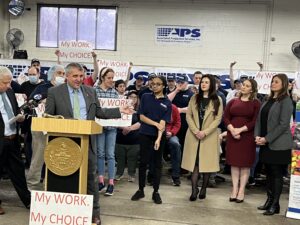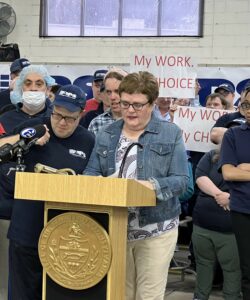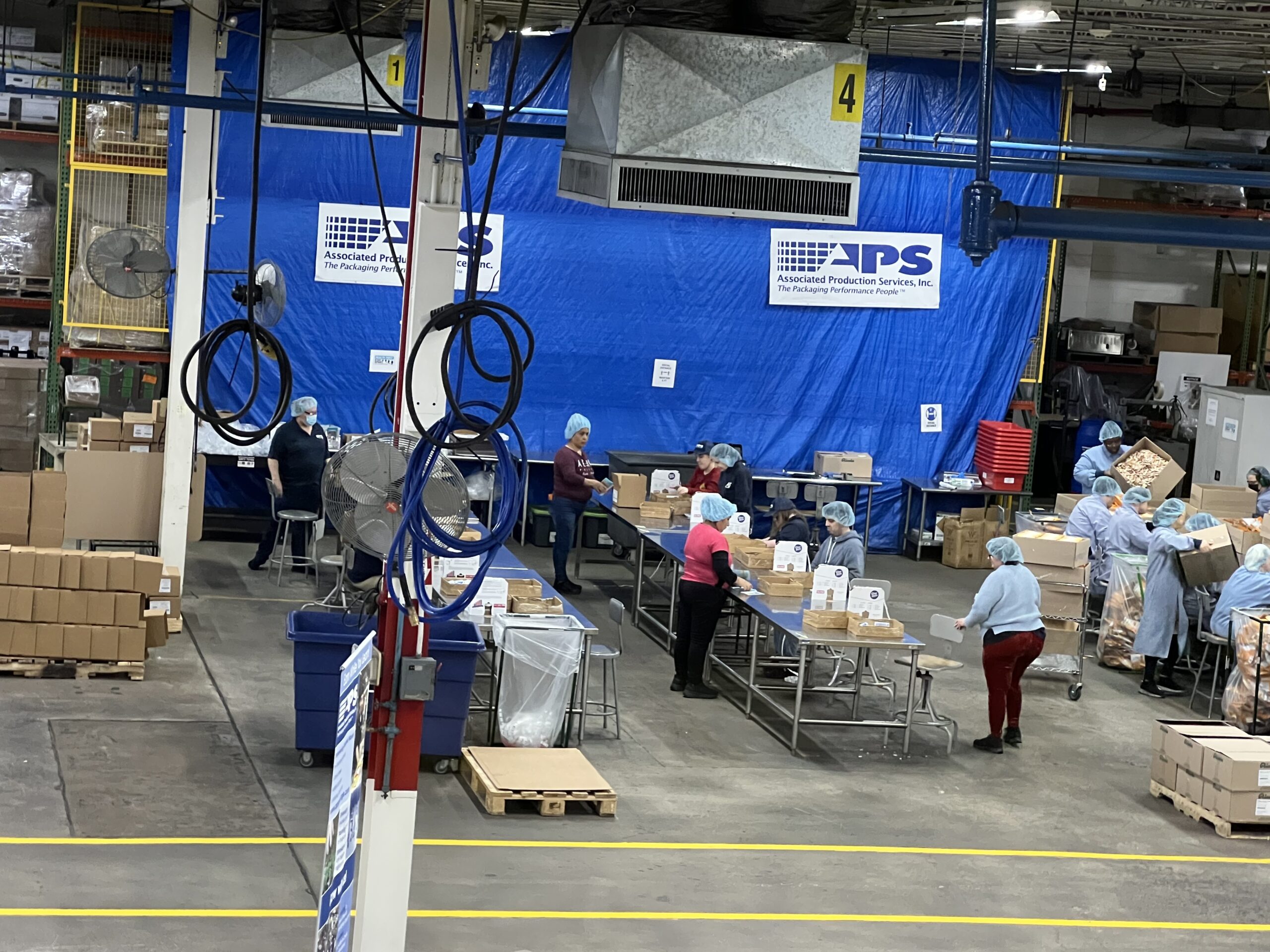State Sen. Frank Farry, accompanied by Bucks County Representatives K.C. Tomlinson, Kristin Marcell, and Shelby Labs, highlighted employment choices for intellectually disabled workers at a press conference Tuesday at Associated Product Services.
A new report from the Joint State Government Commission mandated by a resolution that Farry (R-Bucks) authored when he was a state representative focuses on ensuring that people with disabilities and their families have choices.
Farry said there was “a war” on sheltered workplaces for people with disabilities in 2016 and 2017 and a push to change the rules.
“We had a huge rally at the Capitol,” he said. Workers, their families, and service providers came to the state house to advocate for “my work, my choice.”
“The Office of Developmental Programs, in their rate setting, actually penalizes operations like this for not having a community component,” Farry said. “I can tell you this is the community for the men and women standing behind me. It’s a shame we’re still talking about this issue.”

The 140-page study “reaffirms what we have heard from the people standing behind me, what we have heard from your families. And that is choice should be paramount, and government should not be interfering with that choice.”
“I think it’s important that we use this study moving forward as a blueprint to push back at the unelected bureaucrats who are making decisions to the detriment of the men and women behind me,” said Farry.
“It’s important to note there is a wide spectrum of people like my son who need specialized levels of support that’s not available at other centers of employment,” said Gail Thibodeau. Her son, Matt, has worked at Associated Produce Services for 17 years.
To fight for the employment program, Thibodeau and others “started writing a letter campaign to the Department of Human Services. And we wrote so many letters they asked us to stop writing letters. So we wrote more letters. And we did win that one.”
Farry and Gene DiGirolamo, formerly a state representative and now a Bucks County commissioner, fought the bureaucrats and others who wanted to end those programs where disabled people are paid to work in a supportive setting. Thibodeau noted they also continue to receive Social Security disability payments.
Thibodeau, of Middletown, is also involved in a national organization, the Coalition for the Preservation of Employment Choice, that fights to allow families and individuals to make employment choices.
“My son is filled with pride coming to work at APS five days a week,” said Thibodeau. He learns new skills under the direction of caring support staff. He makes new friends. He loves his job so much that he’s our alarm clock each weekday.”
Matt Thibodeau added, “Good money! Good paycheck!”
Sharon and Bob DeNucci’s son, Bobby, has worked at APS for nine years.
“I can’t believe we’re still talking about this,” said Sharon DeNucci of Bristol.
“As a parent of an individual with disabilities, our job is never-ending. I’m not just here on behalf of my son but of all the individuals behind me. Every time I drop him off in the morning, I enjoy watching him and his coworkers as they arrive at work. They’re greeted by APS supervisor Mike, who always has a smile on his face.”
Bobby is “happy and excited to come to work…these employees work in a safe and supported environment…I truly believe they are respected for who they are, regardless of what they can do. I hope they continue to have the choice for many years to come.”
Bobby DeNucci, 30, said, “Thank you all very much.”

Sharon DeNucci said not every disabled person can work at a supermarket or other business. And as for the complaint that they’re not in a community, APS provides the community. The disabled workers enjoy each other’s company on breaks and at lunch. Bobby DeNucci also participates in Special Olympics and other programs.
APS was founded 47 years ago by Executive Director Jay Belding, a former special education teacher. It employs 385 people in six locations in the area, with 110 working at the Trevose building, where they were packing items into boxes shortly before the press conference. APS receives $4.5 million, about half its income, from the state, said Belding.
Belding said it was a fundamental American value to have a choice to “participate in the workaday world.”
“The APS model, as simply as I can put it, is, we’re here to learn and earn,” he said. “We are putting our workforce into an environment where they are participating in wage-earning activities. And while doing so, they’re learning the basic tenets of work, which include getting along with each other…to working together in the assembly line with everybody moving forward.”
He said the client-workers “form a true community” with the APS employees and each other. And just like anyone else, they take their $3 million in annual wages and spend it in the community.
“Although it seems antithetical, what we want to say is that we want to be one of the choices, and there are many. We believe that families should have a choice to ensure that their folks are participating in the workaday world in an environment that is challenging but safe, adaptive, flexible, and working together with the families, which, in the long run, strengthens the entire community,” said Belding.
Farry added that disabled people “should not be forced to participate in activities they have no interest in.”
“It’s not the ideas of bureaucrats in Harrisburg,” said Farry. “It is person-centered here. The number one recommendation (in the report) promotes freedom of choice. The desires and needs of an individual shall be paramount in all decisions.”
Please follow DVJournal on social media: Twitter@DVJournal or Facebook.com/DelawareValleyJournal

